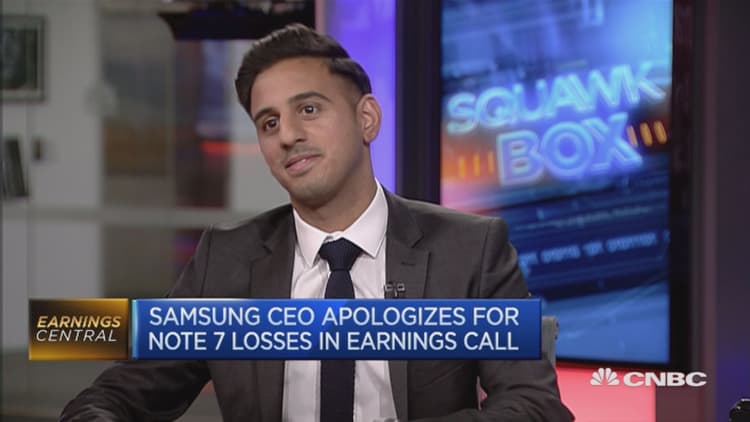
Shares of Samsung Electronics finished higher Thursday despite the Note 7 recall crisis causing a 96 percent plunge for the operating profit of the company's mobile division in the third quarter.
Rather than a sell-off of Samsung's stock on the back of earnings, investors remain bullish for a number of reasons.
Profit plunge baked into price
Earlier this month, Samsung had already warned that it would take a more than $5 billion hit to operating profit from the third quarter of 2016 up to the first quarter of 2017.
Samsung had slashed its operating profit guidance, with final results on Thursday coming in line with expectations.
The South Korean electronics giant now said that it aims to boost fourth-quarter earnings through its flagship Galaxy S7 smartphone as well as lower-tier models. Investors are expecting the third quarter to be the bottom for Samsung.
Also, if the fire issues had not plagued the Note 7, Samsung would have shipped around 11 million of these devices. That is a small fraction of the total 310 million smartphones globally it's expected to ship this year, according to analysis firm Counterpoint Research. So investors see little long-term impact.
The only unknown is whether this will damage Samsung's brand and affect the sales of other smartphone models.
Strength in new display and memory tech
Samsung's semiconductor and display business were bright spots in the third quarter with the company pioneering new chips and screen technology.
"In memory they are the global leader, and we have heard demand trends are strong, supply is constrained which is good for pricing," Neil Campling, senior research analyst at Northern Trust Securities, told CNBC by phone.
In addition, Samsung is the market leader in so-called organic light-emitting diode (OLED) display technology for small screens used in smartphones and other devices. Campling said mobile devices are moving from liquid crystal display (LCD) technology to OLED. This should help Samsung.
"In small size OLED Samsung is the 600 pound gorilla," Campling said.
Heir apparent appointed to the board
On Thursday, shareholders approved the appointment of Lee Jae-yong to Samsung's board. He is the grandson of Samsung's founder and the move is seen as an important step as Samsung navigates the choppy waters post-Note 7 recall.
He is the South Korean giant's heir apparent and was said to be a key player behind the scenes since his father was unable to lead after a heart attack in 2014.
His appointment comes just weeks after activist hedge fund Elliott Management called on Samsung to simplify its complex ownership structure, which is made up of around 70 "chaebols" or subsidiaries.
Investors feel that the younger Lee will be the person who can bring more clarity and transparency around the company's corporate governance. The company said it would respond to Elliott Management's letter by the end of November.
Share buybacks tempting
Samsung said on Thursday that it was also considering a share buyback plan. This involves the company purchasing shares from investors.
The prospect of this is tempting, because it could lead to Samsung cancelling those shares it buys back. This would help support the company's share price. However, no exact details about the process were disclosed.
Potentially undervalued
With earnings potentially hitting the bottom and Samsung looking strong in new market areas, investors are betting that Samsung shares will continue to rise.
So far this year, Samsung's stock is up 25 percent and closed on Thursday at 1.57 million won per share ($1,377). The market is bullish, with Nomura for example having a 12-month price target of 2 million won for Samsung's shares. This represents upside of over 27 percent.
At the same time, Samsung is trading on a 11.67 price-to-earnings ratio. This price-to-earnings ratio is a metric that investors use to value a company based on current share price and earnings per-share. Apple meanwhile trades on 13.5 times price-to-earnings. Analysts said this low multiple makes it an attractive stock.
"Looking at where the stock trades, it's now looking really cheap, I'm warming up to this," Campling said.


